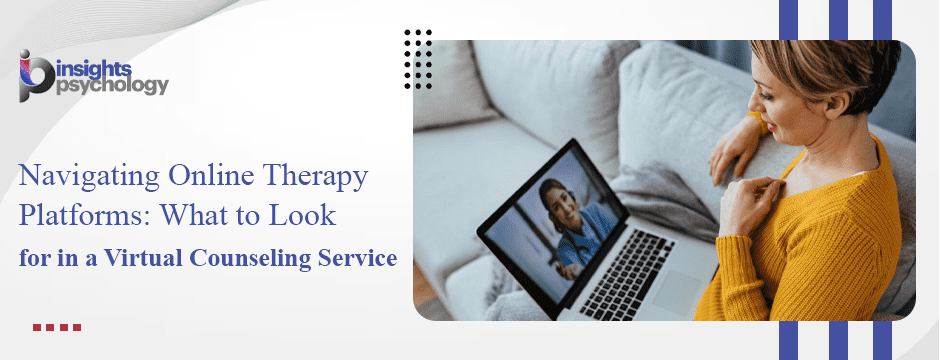In recent years, the rise of digital technology has transformed mental health care, making therapy more accessible than ever before. Online counseling services have become a lifeline for individuals seeking professional support from the comfort of their homes. However, with so many platforms available, choosing the right one can feel overwhelming. Whether you are considering Minnesota online counseling or looking for general online mental health counseling, understanding what to look for in a virtual counseling service is essential for a positive therapy experience.
In this comprehensive guide, we’ll explore the key factors to consider when selecting an online counseling service and how to make the most of your therapy sessions.
Why Choose Online Counseling Services?
Online counseling services have gained immense popularity due to their convenience, affordability, and accessibility. Here are some of the major benefits of mental counseling online:
- Accessibility – No need to travel; access professional help from anywhere.
- Affordability – Many online platforms offer cost-effective alternatives to traditional therapy.
- Privacy and Confidentiality – Sessions are conducted in a secure, private environment.
- Flexibility – Schedule appointments that fit your busy lifestyle.
- Diverse Specializations – Find therapists who specialize in different mental health concerns.
Whether you’re dealing with anxiety, depression, relationship issues, or stress, online counseling services can provide the support you need.
What to Look for in an Online Therapy Platform
With the rise of virtual counseling, selecting the right online therapy platform is essential for a smooth and effective mental health experience. Several factors play a crucial role in ensuring you receive quality care tailored to your specific needs. Here’s what you should consider when choosing an online therapy service:
1. Licensed and Qualified Therapists
One of the most critical aspects of online therapy is ensuring that the professionals available on the platform are licensed and qualified. A reputable platform should provide detailed information about its therapists, including:
- Credentials – Look for licensed professional counselors (LPCs), psychologists (Ph.D. or Psy.D.), clinical social workers (LCSWs), or psychiatrists (MDs) with relevant certifications.
- Specializations – Therapists should have expertise in the areas you need help with, such as anxiety, depression, trauma, relationship issues, or grief counseling.
- Years of Experience – Seasoned professionals with a track record of helping clients can be a better fit for certain mental health challenges.
- Client Reviews and Ratings – Reading testimonials and feedback from previous clients can provide insights into the effectiveness of the therapy sessions.
- State Licensing – If you’re seeking online counseling in Minnesota or any other state, ensure the therapist is licensed to practice in your jurisdiction, as therapy laws vary by location.
2. Types of Counseling Services Offered
Not all online therapy platforms offer the same services. Some specialize in specific mental health areas, while others provide a broad range of options. Consider a platform that offers the type of counseling that aligns with your needs, such as:
- Individual Therapy – One-on-one sessions focusing on personal mental health and emotional well-being.
- Couples Therapy – Marriage and relationship counseling for partners looking to strengthen their bond or resolve conflicts.
- Family Therapy – Sessions tailored to address family-related challenges, including parent-child relationships and family dynamics.
- Teen Counseling – Specialized support for adolescents dealing with academic pressure, social issues, or emotional struggles.
- Specialized Therapy – Some platforms offer niche services like trauma therapy, addiction counseling, LGBTQ+ support, career coaching, and cognitive behavioral therapy (CBT).
3. Methods of Communication
Different online therapy platforms provide various ways to connect with therapists. Consider which method best suits your comfort level and lifestyle:
- Video Sessions – The closest alternative to in-person therapy, allowing for face-to-face interaction.
- Audio Calls – Ideal for those who prefer verbal communication without video.
- Live Chat/Text Therapy – Great for individuals who feel more comfortable expressing themselves in writing.
- Email Therapy – Allows for in-depth discussions and a written record of progress, which can be useful for reflection.
4. Platform Security and Privacy Policies
Since mental health discussions involve sensitive and confidential information, it’s essential to choose a platform that prioritizes security and privacy. Key factors to look for include:
- End-to-End Encryption – Ensures that your conversations remain private and secure.
- HIPAA Compliance – Platforms that follow the Health Insurance Portability and Accountability Act (HIPAA) regulations safeguard your health information.
- Anonymous or Pseudonymous Sessions – Some platforms allow users to remain anonymous for additional privacy.
- Transparent Data Policies – Make sure the platform clearly states how your data is stored, shared, and protected.
5. Ease of Use and Accessibility
A seamless user experience is vital for effective therapy. Consider platforms that offer:
- A Simple and Intuitive Sign-Up Process – A hassle-free registration and onboarding process.
- Easy Appointment Scheduling – Flexible booking options for therapy sessions.
- Mobile App Availability – Allows you to access therapy on the go from your smartphone or tablet.
- Reliable Customer Support – Responsive technical assistance for troubleshooting and resolving issues.
6. Cost and Insurance Coverage
Affordability is a major consideration when choosing an online therapy platform. Compare pricing plans and check if:
- The Platform Accepts Health Insurance – Some services work with insurance providers, making therapy more affordable.
- Flexible Payment Options – Look for pay-per-session, subscription plans, or installment payment options.
- Sliding Scale Pricing – Some platforms offer reduced rates based on income to ensure accessibility for all individuals.
- Free Initial Consultation – Many platforms provide a free session or trial period, allowing you to test the service before committing.
7. Trial Sessions and Customer Reviews
Before choosing a platform, consider trying a trial session or looking for platforms that offer a money-back guarantee if you’re unsatisfied with the service. Additionally, reading verified customer reviews can provide insight into the quality of the platform, therapist effectiveness, and overall user experience.
8. Emergency and Crisis Support Availability
Online therapy platforms are excellent for routine mental health support but may not be suitable for crisis situations. Ensure that the platform provides:
- Emergency Contact Information – Clear guidelines on what to do in urgent mental health situations.
- Referrals for Crisis Support – Access to hotlines and immediate mental health resources.
- 24/7 Support Options – Some platforms offer round-the-clock support for high-risk cases.
Tips for Making the Most of Online Counseling
Once you’ve selected the best online therapy platform, here are some practical tips to maximize your experience:
- Set Clear Goals – Outline your therapy objectives and what you hope to achieve.
- Create a Distraction-Free Space – Find a quiet and private area to enhance focus during sessions.
- Be Honest and Open – Transparency with your therapist leads to better outcomes.
- Take Notes – Jot down key insights and strategies from each session.
- Practice Self-Care – Implement coping techniques and self-care routines recommended by your therapist.
- Stay Consistent – Regular therapy sessions contribute to long-term mental health improvements.
Final Thoughts
Finding the right online counseling services can be a transformative step toward better mental well-being. Whether you are looking for Minnesota online counseling or general online mental health counseling, taking the time to research and evaluate your options is crucial.
By considering factors like therapist qualifications, service types, communication methods, security, and cost, you can choose a platform that aligns with your needs and ensures a positive therapy experience.
At Insights Psychology, we are committed to helping individuals find the right mental health resources. If you’re exploring mental counseling online, reach out to learn more about how we can support your journey toward well-being.
Need Professional Online Counseling?
Start your therapy journey today with trusted professionals. Contact Insights Psychology for personalized, confidential, and effective online counseling services.
The right therapy platform matters—but so do policies. Read our article on transgender mental health legislation to see how accessibility is evolving.
Everything You Need to Know About Online Therapy and Psychologists
1. What is the most popular online therapy platform?
While many Online Therapy Platforms exist, Insights Psychology offers high-quality virtual therapy with licensed professionals. If you’re looking for a trusted psychologist in Minnesota, Insights Psychology provides both online and in-person therapy, ensuring accessible and personalized mental health support.
2. Are online psychologists legit?
Yes, an online psychologist is a licensed mental health professional who provides therapy through virtual sessions. They meet the same licensing requirements as in-person therapists. Many states, including Minnesota, allow psychologists to practice across PSYPACT-approved states, ensuring accessible and high-quality care.
3. Can online psychologists prescribe medication?
A psychologist in Minnesota cannot prescribe medication, whether online or in person. However, licensed online psychiatrists and medical doctors can prescribe medications through Online Therapy Platforms offering medication management services. Clinics like Insights Psychology provide psychiatric evaluations and medication management through telehealth.
4. Can a psychologist diagnose you online?
Yes, an online psychologist can diagnose mental health conditions through virtual assessments. Licensed professionals use standardized psychological tools and clinical interviews to evaluate symptoms. Many Online Therapy Platforms and private telehealth services in Minnesota offer online diagnosis and treatment plans.
5. Is therapy better, in person or online?
Both online and in-person therapy have benefits. Online virtual counselors provide flexible and convenient care, while in-person counselors near MN offer face-to-face interaction, which some find more effective. The best option depends on personal preference, condition severity, and accessibility.

